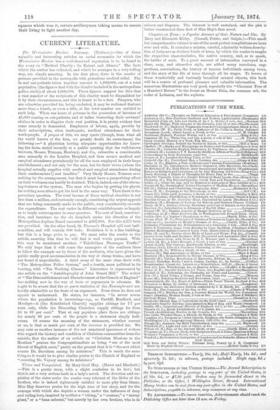CURRENT LITERATURE.
the essay on " Medical Charity : its •Extent and Abuses." The facts which the author has collected, and which he arranges in a very telling way, are simply amazing. In the first place, there is the number of persons provided in the metropolis with gratuitous medical relief. The in and out-patients taken together amount to 1,200,000, out of a total population (the figures deal with the district included in the metropolitan police circle) of about 4,000,000. These figures suggest the idea that a vast number of the recipients of this charity must be disqualified for it by their circumstances, and this is found to be a fact. Paupers, who are otherwise provided for, being excluded, it may be reckoned that not more than a fourth, or even a fifth, of the total number are entitled to such help. When one hears of persons in the possession of incomes of £1,000 coming as out-patients, and of ladies borrowing their servants' clothes in order to disguise their real position, it is pretty evident that some remedy is demanded. Employers of labour, again, provide by their subscriptions, often inadequate, medical attendance for their work-people. propos of this, we may quote (though, from what all the world knows of the firm, we greatly doubt its correctness) the following :—" A physician having adequate opportunities for know- ing the facts, stated recently at a public meeting that the well-known brewers, Messrs. Truman, Banbury, and Co., subscribe a considerable sum annually to the London Hospital, and thus secure medical and surgical attendance gratuitously for all the men employed in their large establishment ; and not only for the men, but for their wives (whom the hospital actually supplies with medical and surgical attendance during their confinements!) and families." Very likely Messrs. Truman save nothing by the arrangement, but that it must have a pauperising effect on their workmen can hardly be doubted. This is, indeed, one of the alarm- ing features of the system. The man who begins by getting his physic for nothing soon tries to get his food in the same way. Then there is the pecuniary question. The total income of these medical charities is not less than a million, and curiously enough, considering the urgent appeals that are being constantly made to the public, very considerably exceeds the expenditure. The cost varies in different establishments so largely as to imply extravagance in some quarters. The cost of land, construc- tion, and furniture for the six hospitals under the direction of the Metropolitan Asylum Board amounted to £487,000. For this 4,271 beds are provided. On the other hand, St. Thomas's Hospital will cost half- a-million, and will contain 600 beds. Doubtless it is a fine building, but this is a large price to pay. We must refer the reader to the article, assuring him that he will find it well worth perusal. With this may be mentioned another, " Third-Class Passenger Traffic." We only hope that it will rouse the managers of the southern lines to follow the example set by those' of the northern, who have given the public really good accommodation in the way of cheap trains, and have not found it unprofitable. A third essay of the same class deals with "The Metropolitan Police System," and a fourth, more political in its bearing, with "The Working Classes." Literature is represented by one article on the " Autobiography of John Stuart Mill " The writer of " The Disestablishment and Disendowment of the Church of England" has nothing new in the way of facts or arguments to advance. He ought to be aware that the ex parte statistics of the Nonconformist are hardly admissible as the basis of an argument. Even these he does not appear to understand. He states, for instance, "In newer towns where the population is increasing—e.g., as Cardiff, Bradford, and Merthyr—it [the Established Church] supplies sittings for 71 per cent, only, while the Dissenting Churches supply sittings for from 84 to 89 per cent." That at any populous place there are sittings for nearly 96 per cent. of the people is a statement simply ludi- crous. Of course the meaning of the statement, whether correct or no, is that so much per cent. of the increase is provided for. We may note as another instance of the not unnatural ignorance of writers who regard the history and condition of Christian communities from the outside, that the author of an article on "Christian Missions to the Heathen" praises the Congregationalists as being "one of the most liberal of English sects," partly on the ground that it is "the sect which counts Dr. Davidson among its ministers." This is much the same thing as it would be to give similar praise to the Church of England as " counting Mr. Voysey among its ministers."


































 Previous page
Previous page